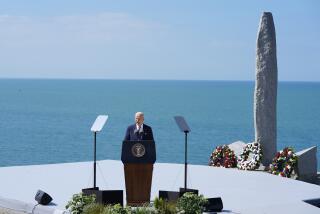Reporter’s Notebook : V-E News Gave Him ‘Chill,’ Reagan Says
- Share via
STRASBOURG, France — Ronald Reagan “felt a chill, as if a gust of cold wind had just swept past” when he learned that the Nazis had surrendered and that the war in Europe was finally over, he recalled to the European Parliament on Wednesday, the anniversary of V-E Day.
“On that day 40 years ago, I was at my post in an Army Air Corps installation in Culver City, Calif.,” said Reagan, who then was 34 and attached to a military unit making training films.
“Passing a radio,” the President remembered, “I heard the words, ‘Ladies and gentlemen, the war in Europe is over.’ I felt a chill, as if a gust of cold wind had just swept past. And even though for America, there was still a war in the Pacific Front, I realized I would never forget that moment.”
He added: “This day can’t help but be emotional, for in it we feel the long tug of memory. We’re reminded of shared joy and shared pain.”
Television correspondents who cover the President agree that he is unexcelled in his ability to use a TelePrompTer, a device that projects a speech text onto a television-sized screen. The TelePrompTer user can read alternately from two screens--one just in front of the podium and the other to the side--but the screens are virtually invisible to the audience.
That’s the way it’s supposed to work and usually does. But the system completely broke down for Reagan during the first 15 minutes of his address to the European Parliament on Wednesday.
White House spokesman Larry Speakes later blamed complications arising from the difference in U.S. and European electrical currents.
Until frantic technicians, hidden from the audience in a room just behind the podium, finally fixed the machine, the President had to use a written text he fortunately had taken to the podium.
There were a couple of embarrassingly long pauses when Reagan lost his place and had to struggle to find it.
Ironically, this was the first stop on Reagan’s European trip where he used the TelePrompTer. All his other speeches had been delivered in his patented, skillful style.
Reagan Administration officials seemed to have been crossed up by the Kremlin on Wednesday in a case of public relations one-upmanship.
Presidential aides announced that Reagan had decided to send Soviet leader Mikhail S. Gorbachev a brief message on the 40th anniversary of V-E Day commemorating the two superpowers’ triumphant World War II military alliance. They said the President decided to do this even though they had been informed by the Kremlin that Gorbachev would not reciprocate.
“We didn’t get an answer and we don’t expect one,” one White House official told reporters.
That was in Strasbourg, about noon, Europe time. When Reagan got to Lisbon several hours later, Administration officials still said Gorbachev would not be sending the President a message. They implied that this was illustrative of the new Soviet leader’s hard-line attitude.
But about that time, the Kremlin was releasing to the news media in Moscow the text of a telegram that Gorbachev had announced he was sending to Reagan.
Strasbourg went all out during Reagan’s visit to express friendship for the United States.
The Alsace-American Friendship Society and the local newspaper, the Nouvelle Alsacienne, jointly sponsored an all-day American fair in the Place Kleber in the heart of the city. There was an American country music group, a U.S. Army band from West Germany and Alsatian music and folk dancing. Food included hamburgers, hot dogs and corn on the cob.
The right-wing National Front plastered the city with “Welcome President Reagan” posters in English, decorated with French and American flags.
On the other hand, 300 Communists and their left-wing supporters gathered in front of the City Hall early in the day with “Reagan Go Home” placards and protest banners.
Notebook contributors were Don Cook, Stanley Meisler, Jack Nelson and George Skelton.
More to Read
Sign up for Essential California
The most important California stories and recommendations in your inbox every morning.
You may occasionally receive promotional content from the Los Angeles Times.













